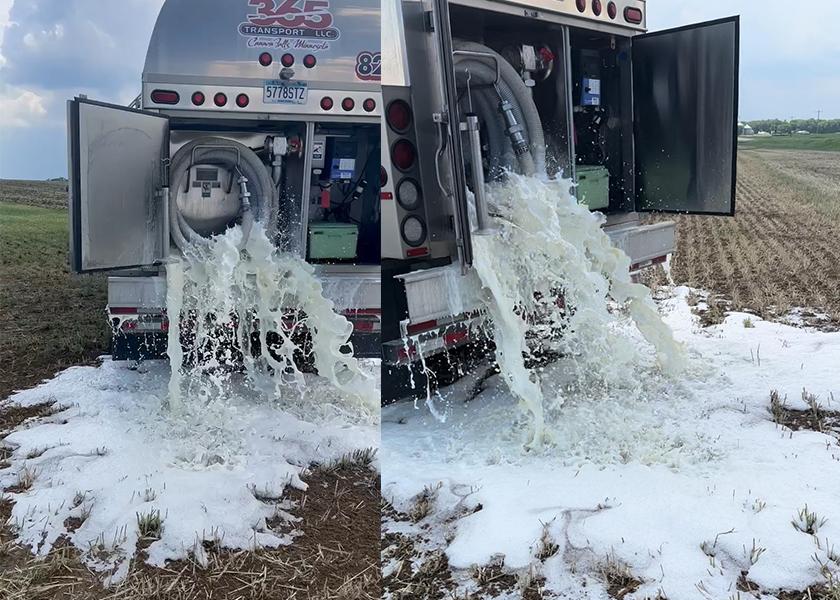Midwest Dairy Producers Forced to Dump Milk

With much of the Upper Midwest processing capacity maxed out in terms of milk production, finding a new home for milk is not an easy task. Lucas Sjostrom, the executive director of Minnesota Milk shared that Hastings Creamery ability to discharge is shut down for 30 days, as they need to take their waste elsewhere. Sjostrom shares they are continuing operations and are accepting and diverting milk from the same farmers as needed.
“We’ve been working over the past few weeks with the farmers to find alternative markets while government officials have been looking to find a solution to keep the plant open,” he says. “We believe every milk buyer across the Upper Midwest is aware of the situation. Plants are already voluntarily dumping milk on-farm on certain days and even though we have transportation available, most plants cannot currently take the milk even for free.”
Hastings Creamery processes 150,000 lbs. of raw milk each day and purchases it from dairy farmers located in both Minnesota and Wisconsin. A variety of dairy products are under Hastings Creamery label, as well as some private labels for other companies and grocery store chains.
Justin Malone, one of the creamery’s owners, shared that it is a tough time in the dairy industry and some farmers are forced to dump milk because they can’t find any processing plants with the capacity to accept additional milk.
Other Farms Forced to Dump Milk, Too
The reality is that not only Hastings Creamery is impacted by an oversupply of milk on the market. Mitch Thompson owns and operates Thompson Family Dairy in Lewiston, Minn., and is a member-owner of Associated Milk Producers Inc. (AMPI). He shared that he had to dump milk from his herd on June 2.
“The milk hauler picked our milk up and said, ‘Well, I'm taking it to another farm’s field that just chopped rye to dump the milk in the field,’” he says, noting that he still will get paid for that dump milk, but shares the whole cooperative suffers when milk isn’t sold.
Thompson is uncertain on how long dumping milk will continue but shares that he is concerned about the current state of the dairy industry.
“We're shipping around 70,000 lbs. of milk a day, so I worry where’s all that milk going to go,” he questions. “If they keep dumping the milk, how bad is our [milk] price going to get?”
At the time of the interview, Thompson shared that his farm’s milk was picked up and taken to the plant on June 5.
“It sounded like they were going to get a couple of other different farms and dump their milk like everybody’s taking their turn,” he shared.
Meanwhile, it’s normal business at Thompson Dairy, as cows must be milked every day. Even when the milk is then dumped into a nearby field.
“This is a real kick in the shorts. How long can you keep doing this when the milk price is so low already,” Thompson notes, sharing that he is concerned about the current situation of milk being dumped, as well as low milk prices.
“I just wonder when will things turn around,” he asks.
Flooded Milk Market
Sarah Schmidt, vice president of marketing with AMPI, says the reason producers are having to dump milk is simply because there is currently a flooded milk market.
“There is more milk on the market and fluid milk sales have declined dramatically, especially with schools closing for the summer,” she says. “Those fluid milk sales were there for the past several months and simply are not there now.”
Schmidt comments that milk from outside the Upper Midwest is pushing into the region and displacing typical, seasonal sales. She also notes all AMPI milk receiving plants are running at full capacity.
“The milk produced on member farms is exceeding our processing and marketing capacity,” she says. “The team is working hard to keep milk moving into processing facilities.”
Schmidt says unfortunately they do not see any specific signs as to when the tides are going to turn.
“What we do know is that dairy farmers produce a fantastic product and there is good demand for cheese and butter. I'm hopeful low cheese market prices make their way into the grocery stores, spurring increased sales,” she says.







